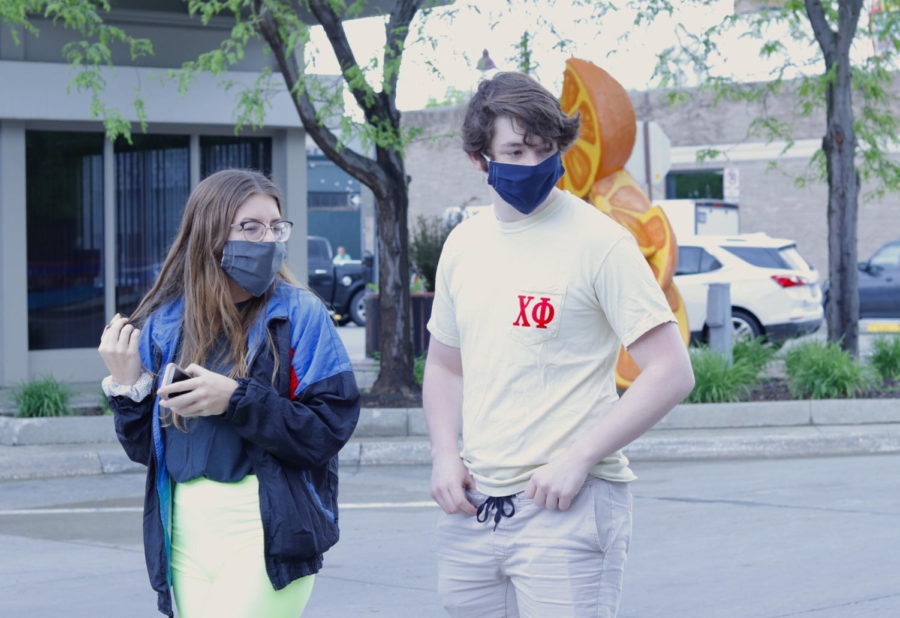Iowa will remain an outlier from the mandating mask movement
Self-protection measures such as bringing personal hand sanitizer, staying home when sick and wearing a mask was encouraged by the Ames Main Street Farmers’ Market.
July 30, 2020
Iowa is now one of the only states to have no known mask requirement in the country.
As Iowa’s confirmed COVID-19 cases reach over 43,000, the debate of whether to mandate face coverings is becoming a life or death question for states across the country.
Gov. Kim Reynolds has encouraged Iowans to wear masks but has not issued a statewide mandate.
South Dakota is the only other state to have no known mask requirements, according to Masks4Alll.
“Protecting yourself means you’re protecting your friends, your family members, your co-workers, and your fellow Iowans. Each and every one of us has it in our power to slow the spread of COVID-19,” Reynolds said Thursday in an Iowa Department of Public Health news release. “I trust Iowans to do the right things.”
Iowa City and Muscatine are two Iowa cities that have taken matters into their own hands, despite the governor’s proclamation, and the cities have attempted to require face coverings in public if social distancing is not possible.
“Simply put: By wearing a face mask, you are showing your fellow residents that you care about them,” Iowa City Mayor Bruce Teague said in an address on Facebook Live, according to the Daily Iowan. “If we comply with this order, Iowa City will see the difference. We’re all in this together, and this means that we can all do our part.”
The city of Ames has yet to issue an official mandate, but face coverings are required in city buildings such as City Hall, Ames Public Library and Ames City Auditorium. Local officials also encourage the use of face coverings.
Ward 4 Rep. Rachel Junck said the Ames City Council is working to increase signage around town to remind residents to wash their hands and wear face coverings in public spaces.
“I would really like to be able to be as strong as possible to keep our community safe, I think that would come in the form of a mandate, but unfortunately the City Council does not have the power to do that, that is reserved for Governor Reynolds’ emergency power,” Junck said. “The best we can do at this point is have the most consistent messaging. Have masks required on Iowa State property, city property and individual businesses can make their decisions as well, and to have as many people wearing face masks as possible would be the best thing.”
Counties and cities work to juggle reopening the economy and keeping cases down, and Iowa State University, along with others, will require students to wear face coverings while attending class.
Chair of the political science department, Mack Shelley, said the position the state is taking is that the emergency proclamation overrides home rule.
“From the local government perspective, they are not going to like that idea because that means essentially anything they want to do could be vitiated by the state, sort of in an arbitrary manner,” Shelley said. “If you don’t have any authority except for what the state says then you have no authority then, right? So local officials tend to not appreciate the state getting in their way too much.”
Iowa State University is able to mandate things like face coverings due to the fact that they need approval from the Board of Regents. The Board of Regents governs five public education institutions in the state of Iowa through policymaking, coordination and oversight provided by law, according to the Board of Regents website.
“Even though these are public universities they are not municipalities or local governments, so I think for that reason they get a fair bit of latitude compared to what a city mayor would have,” Shelley said. “Something like Iowa State University, even though it is within the municipality of Ames, it is not a separate government entity. Even though it is not a private institution it operates in some respects as though it were.”
Junck said she sees the decision to mandate masks is better in the hands of local leaders and that the proclamation overrules home rule.
“I definitely think it is a local government issue, every town is going to be different and has rates of coronavirus falling and rising at different times,” Junck said. “I think it would be best to place that decision with our local community leaders instead of at the state level.”







